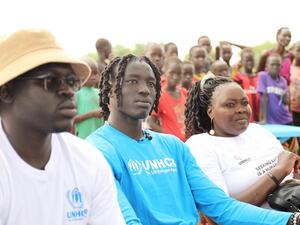Insecurity aggravates the plight of the displaced at sprawling Bangui site
Insecurity aggravates the plight of the displaced at sprawling Bangui site

Rebecca in the M'Poko site, where she was assaulted. She lives there with her three children. Her husband was killed in December.
BANGUI, Central African Republic, June 2 (UNHCR) -Rebecca* is nervous; she clenches her fists and her eyes dart around, keeping an eye out for someone, something. She sits out in the open on a chair and, in a trembling voice, tells about her recent rape in M'Poko, a site sheltering tens of thousands of people displaced by months of violence in Bangui.
Hers is a disquieting testimony on the alarming rise in insecurity at the largest site for internally displaced people (IDP) in the Central African Republic. In response, the IDPs have set up a mechanism to warn of violence at the site, and UNHCR is working with its partners and the government to protect people at M'Poko and to boost safety, but it remains a cause for great concern.
For Rebecca, the assault remains vivid in her mind. "I was terrified when I saw the eight men coming, around 10 o'clock at night," the 22-year-old told UNHCR. "My screams weren't enough to stop them from breaking into my hut, to grab and hurt me. It seemed that hours had passed before the neighbours came and chased them away." She was taken to a clinic in M'Poko, staying there for several days before returning to her hut at the site.
To make things worse, the horror of the attack came as she was still grieving the murder of her husband, an army officer. He was betrayed by a friend and killed by members of the Seleka armed group at the start, last December, of a fresh wave of inter-communal violence.
"This would never have taken place, if my husband hadn't died at the hands of the Seleka," Rebecca said of her rape. After his death, she found her house looted - "There was nothing left: no beds, no clothes, no kitchen equipment." She decided to leave for M'Poko with her three children.
Like many other women and girls, she thought she would be safe at the M'Poko site, located by Bangui's airport and now home to more than 52,000 mostly Christian IDPs. These people are not ready to return to neighbourhoods that remain volatile.
But the security situation in M'Poko itself has been getting worse and this is hindering efforts to provide protection and to deliver assistance. UNHCR's partners have monitored an increasing number of cases of theft, rape, assassination and abduction, involving ransom or torture at the site, perpetrated by armed groups.
The IDPs have taken measures to try and tackle the problem, including the launch of a warning mechanism. And they use a hot line to report security incidents and to get information on the available medical, legal and other services. In addition, community groups are receiving training on protection monitoring, and UNHCR's partners are liaising with security personnel to improve safety at M'Poko.
The danger of physical attacks, like the one inflicted on Rebecca, is not the only security threat for the displaced. In the majority of the 43 displacement sites in Bangui, which host more than 130,000 people, the onset of the rainy season brings health risks because of the poor state of the drainage system, which can contribute to the spread of disease. Poor soil exacerbates the drainage problems, leaving stagnant ponds where mosquitos breed.
UNHCR is working to address this problem by facilitating the return home of the IDPs. Partners facilitate meetings between representatives of the displaced population and district authorities in Bangui.
For Rebecca, though, return is not an option, as she still fears for her life if she returns to her home in the Miskine district. In cases like hers, UNHCR is working with partners to assist the displaced by meeting their basic needs in IDP sites. It is also working with the municipal and national authorities to set up sites in Bangui where people can at least live in safe and dignified conditions during the current rainy season.
Meanwhile, in Bangui and the neighbouring cities of Bimbo and Begoua, an evaluation exercise is taking place to determine how much damage has been done to homes. The assessment mission will be followed by the distribution of shelter kits for home repairs.
Rebecca, meanwhile, hopes perhaps naively that her attackers will be brought to justice one day. "My dream is for a better future in which my children can resume their studies, amid security and peace," she says, echoing the hopes of many.
*Name changed for protection reasons.
By Aikaterini Kitidi in Bangui, Central African Republic








